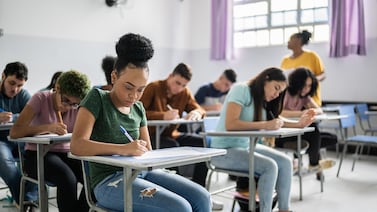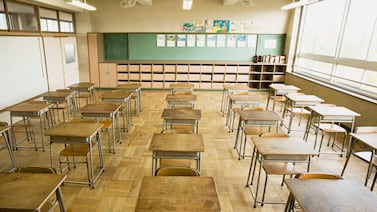Sign up for Chalkbeat New York’s free daily newsletter to keep up with NYC’s public schools.
Graduation rates in New York City remained essentially flat last school year, decreasing by roughly a percentage point from the previous year to about 82.8%, according to data released by the state’s Education Department on Thursday.
It follows a similar trend occurring statewide, as New York’s overall high school graduation rate dipped slightly from 87% to 86.4% last year.
Students in the class of 2023 entered high school in the fall before the pandemic and saw their first years dramatically disrupted by school closures, remote learning, and social distancing. The data represents a slight reversal from those who entered high school a year prior — with data from 2022 showing about a more than 2% uptick in graduation rates in the city, and about a single percentage point rise statewide. Students in recent years benefited from some relaxed requirements as officials sought to avoid punishing those whose schooling was upended by the pandemic — with Regents exams initially canceled and later reinstated with a policy that made it easier to appeal low scores.
Over the past decade, the state’s graduation rate has jumped by 7.3%, rising from just over 79% for students who entered high school in 2010, according to state officials.
“Despite this trajectory, additional work must be done to improve outcomes for all students, especially our most vulnerable populations,” JP O’Hare, a state Education Department spokesman, said in a statement. “Our goal is to enable schools to provide different levels of support to each student based on what they need to be successful. The Department remains committed to removing barriers to opportunity for students and providing a foundation for educational excellence and equity to serve New York’s diverse student population.”
New York City officials, meanwhile, held up the numbers as evidence of the success of mayoral control.
Before this type of school governance system was implemented 20 years ago, graduation rates hovered around 50%, NYC schools chancellor David Banks said in a statement. Mayoral control, he said, “has improved transparency, streamlined decision-making, ensured equitable funding across the city, and enabled systemwide, transformational programs like NYC Reads.”
Disparities in graduation rates across different demographic categories remained largely the same in the city in 2023.
White students saw just over a two-point drop, with about 86.7% graduating on time. Meanwhile, Black and Asian American students saw slightly smaller dips of just under half a percentage point, with rates of 80.3% and 91.7%, respectively. Graduation rates for Latino students remained virtually unchanged at about 79.8%.
Students with disabilities and those learning English continued to graduate at significantly lower rates. For those with disabilities, the rate dropped by just over half a percentage point to about 63.6%, while students learning English dropped just over five points, to a rate of about 61.8%.
Aaron Pallas, a professor at Columbia University’s Teachers College, noted data from recent years showed fewer students graduating with advanced diplomas, despite upticks in overall graduation rates. He also questioned how recent graduation trends persisted despite “the extraordinary chronic absenteeism” experienced during the pandemic, adding “how much students learn is strongly related to how much instruction they receive.”
“Contrasting attendance and graduation rates raises the familiar question of what a high school diploma in New York signifies,” he said. “Is it a good measure of how much a student has learned, or that student’s readiness for life after high school? This inconsistency raises tough questions.”
The latest data comes as state education officials remain engaged in a multi-year effort to rethink what knowledge and skills high schoolers should be required to know upon graduation. As part of that effort, a 64-member Blue Ribbon Commission presented a set of recommendations in November to the state’s Board of Regents.
Among the 12 recommendations, the commission called for increasing the number of assessment options beyond the Regents exams, allowing students to demonstrate their learning in other ways, such as performance-based assessments, capstone projects, and experiential learning. The commission also called for expanding access to career and technical education, better aligning the state’s learning standards with college and career expectations, and more.
But it will still be some time before any of the recommendations are adopted. In a press briefing at the time, State Education Commissioner Betty Rosa called the commission’s findings “a blueprint,” and noted timelines for implementation would be unlikely to come before this fall.
In his Thursday statement, O’Hare noted the state’s Education Department is “currently working to develop proposed guidance and programmatic and regulatory changes” related to the initiative.
Julian Shen-Berro is a reporter covering New York City. Contact him at jshen-berro@chalkbeat.org.







